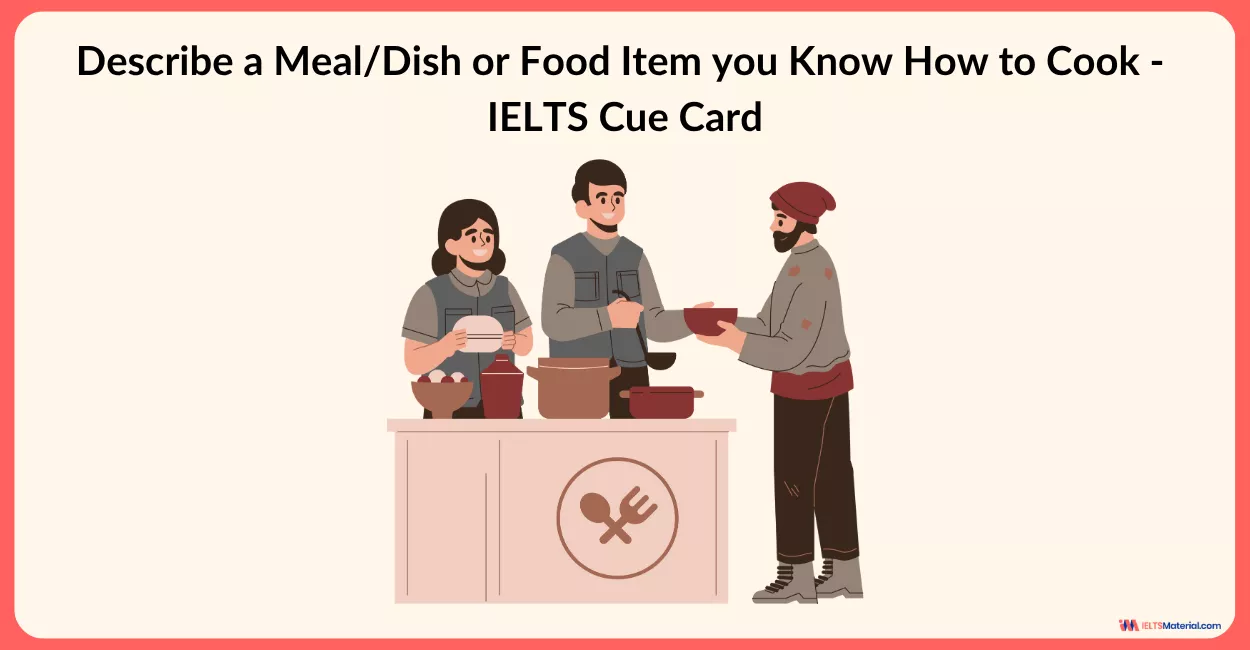Describe a Meal/Dish or Food Item you Know How to Cook - IELTS Cue Card
10 min read
Updated On
-
Copy link
This blog provides 3 Band 9 cue card sample answers for "Describe a Meal/Dish or Food Item you Know How to Cook," with useful vocabulary, & speaking part 3 questions to help you confidently prepare for the IELTS Speaking Exam.
Table of Contents
- Describe a Meal/Dish or Food Item you Know How to Cook
- Describe a Meal/Dish or Food Item you Know How to Cook - Sample Answer 1
- Describe a Meal/Dish or Food Item you Know How to Cook - Sample Answer 2
- Describe a Meal/Dish or Food Item you Know How to Cook - Sample Answer 3
- Describe a Meal/Dish or Food Item you Know How to Cook - IELTS Vocabulary
- IELTS Speaking Part 3 Follow-Up Questions

Limited-Time Offer : Access a FREE 10-Day IELTS Study Plan!
In the IELTS Speaking test, Part 2 requires you to speak for 1–2 minutes on a given topic, which can be challenging without proper preparation. One popular topic is “Describe a Meal/Dish or Food Item you Know How to Cook - IELTS Cue Card.” This blog provides a complete guide with a Band 9 sample answer, useful vocabulary, and examples to help you structure your ideas and speak confidently during the IELTS Speaking exam.
Have a look at the video below for some quick tips to get a Band 9 in IELTS Speaking!
You will have exactly one minute to prepare and speak on a specific helping a family member speaking part 2 topic like ‘Describe a Meal/Dish or Food Item you Know How to Cook - IELTS Cue Card' for IELTS Speaking Part 2.
Describe a Meal/Dish or Food Item you Know How to Cook
You should say:
- what menu/dish it is
- what ingredients are required to cook it
- where or how you learned to cook it
and explain how you cook this food menu/dish.
Describe a Meal/Dish or Food Item you Know How to Cook - Sample Answer 1
First things first, I am a terrible cook. But I can tell you about that one time I tried to cook Maggi. It was during my college days. In my room at the hostel, we used to have an induction cooker brought by one of my roommates. It was a strike day, and there was not much food in our mess. I was hungry as hell, and there was no one in my room as they had all left for home during the vacation. I decided to stay back as I have some assignments to complete. Seeing there was no way to get some food, I tried a hand at my cooking abilities.
There was this pack of Maggi noodles that my friend got free with something that he bought. I took it and read the instructions carefully listed on the back of the noodles pack. So, I took some water in a steel bowl and heated it in the induction cooker. After the water began to boil, I put the Maggi Noodles and the spices that come with it. I gave the noodles and the spices to mix well. Finally, I had hot Maggi noodles before me. I was overjoyed that I had mastered it.
Since then, I have tried making noodles at home in the evening and would serve them to my parents and my brother and they all give me a good response. So that’s one dish I know how to cook. The confidence I gained from making it for the first time has made me interested in cooking and now I am looking forward to making new dishes. Cooking the entire day’s meal for my family is my ultimate dream once I have finished learning their favourite ones.
Join us in our free webinars to learn tricks to drive away your IELTS exam blues! Explore Now!
Describe a Meal/Dish or Food Item you Know How to Cook - Sample Answer 2
I’ve always been passionate about cooking right from my childhood. It is a fun way for me to relieve stress after a hard day at work. So, here, I’d like to talk about a dish/ food item that I know how to cook.
I can cook almost anything and nail it on the first try. So, recently, I invited my friends over and cooked Paprika Roasted Chicken. Believe it or not, a chicken dish is definitely a crowd-pleaser. The drooling paprika roasted chicken is a very easy and quick chicken recipe that calls for only five ingredients, including a whole chicken, sour cream, butter, paprika, lemon juice, honey, and salt to taste.
Well, cooking is something that I inherited from my grandmother, who was a professional chef and owned her restaurant, where I learned how to cook. She used to teach me a variety of non-vegetarian, vegetarian, and baked delicacies whenever I visited her on weekends. In order to cook this chicken, I need to marinate/ rub the chicken with paprika, butter, lime juice, and salt and keep it aside for an hour in a roasting tin. After that, I need to bake the chicken at 222 degrees Celsius for an hour by basting it from time to time with lemon juice and honey. Later, I’ll have to mix the residue of juices with sour cream and pour it over the roasted chicken. Finally, Smoky-sweet Paprika Roasted chicken is ready to be served, and it can also be paired with any creamy dip for maximum indulgence.
Describe a Meal/Dish or Food Item you Know How to Cook - Sample Answer 3
One dish that I know how to cook quite well is chicken biryani, which is a traditional South Asian rice dish that combines fragrant basmati rice with spiced chicken. It’s one of my favourite meals because it’s both flavorful and filling.
To make chicken biryani, the main ingredients required are basmati rice, chicken pieces, onions, tomatoes, yogurt, garlic, ginger, green chilies, and a variety of spices such as cumin, turmeric, coriander, and garam masala. Fresh herbs like coriander leaves and mint are also used to add aroma and freshness.
I first learned to cook this dish from my mother, who taught me the recipe when I was a teenager. I always enjoyed helping her in the kitchen and gradually picked up the techniques, such as marinating the chicken and frying the onions until they are golden brown. Over time, I started cooking it independently for family gatherings and festivals.
The cooking process involves several steps. First, I marinate the chicken with yogurt and spices for a few hours to ensure it absorbs all the flavors. Then I fry the onions and tomatoes and add the marinated chicken, cooking it until it’s tender. Meanwhile, I boil the basmati rice separately, making sure it’s fluffy and not sticky. Finally, I layer the rice and chicken together, sprinkle fresh herbs, and cook it on low heat to allow the flavors to blend. The result is a rich, aromatic biryani that my family always enjoys.
Cooking chicken biryani requires patience and attention, but I find it very rewarding. Every time I prepare it, the aroma fills the kitchen, and it gives me a sense of pride to serve a dish that everyone loves.
Enroll in our IELTS Online Classes to boost your IELTS Speaking Skills!
Describe a Meal/Dish or Food Item you Know How to Cook - IELTS Vocabulary
Here are some IELTS Speaking vocabulary words used in the sample answers for the topic: Describe a Meal/Dish or Food Item you Know How to Cook - IELTS Cue Card.
- Induction cooker
Meaning: an electric stove that heats food quickly
Eg: I cooked Maggi noodles on an induction cooker in my hostel room. - Nail it
Meaning: to do something perfectly or successfully
Eg: I can cook almost anything and nail it on the first try. - Crowd-pleaser
Meaning: something that is liked by many people
Eg: Paprika roasted chicken is always a crowd-pleaser at parties. - Marinate
Meaning: to soak meat or vegetables in spices or sauce before cooking
Eg: I marinated the chicken in yogurt and spices for two hours. - Baste
Meaning: to pour juice or sauce over food while cooking to keep it moist
Eg: I baste the roasted chicken with lemon juice and honey. - Fragrant
Meaning: pleasantly smelling
Eg: The basmati rice used in biryani is very fragrant. - Tender
Meaning: soft and easy to chew
Eg: The chicken became tender after cooking it slowly. - Layer
Meaning: to arrange food in levels
Eg: I layered the rice and chicken together in the pot. - Aromatic
Meaning: having a strong, pleasant smell
Eg: The biryani is aromatic due to fresh herbs and spices. - Indulgence
Meaning: treating yourself with something enjoyable
Eg: Serving the roasted chicken with a creamy dip is a real indulgence.
Grab our Comprehensive IELTS Speaking Band 8 Preparation Course before it’s Out of Stock! Don’t Miss Out!
IELTS Speaking Part 3 Follow-Up Questions
IELTS Speaking Part 3 focuses on abstract and opinion-based questions. Your answers should be longer and show critical thinking. The sample Band 9 responses below demonstrate how to extend answers with examples and reasoning.
1. Tell me about the types of food that people eat in your country.
Well, the food in India is as diverse as its multi-ethnic culture. The exotic delicacies in my country are marked by the subtle uses of herbs and spices that tantalize the taste buds. In addition, each state in the country has its specialty foods, each with its own flavour, taste, and cooking method. For example, North Indians typically eat chicken, meat, and lamb; South Indians create cuisine with spices, herbs, and vegetables; West Indians eat staple foods; East Indians prefer proteins and carbs such as fish, egg, and rice.
2. How are the eating habits of people now in your country different from their eating habits in the past?
People’s eating habits have highly changed with the changing environment over the past few decades. Traditionally, people in my country relied upon home-cooked food, such as steam rice, bread, wheat chapati, along with vegetable curry or pickled vegetables. However, in the recent several decades, there has been a significant shift in the way people consume food, as they have adopted eating packaged, frozen, or canned foods.
3. How healthy is your country’s food?
Of course, Indian food is nutritious, as it typically contains healthy natural protein, good carbohydrates, nutritional quality, natural herbs, authentic homemade spices. Moreover, most Indians prepare their food in hygienic circumstances, ensuring that it is both nutritional and flavorful. As a result, traditional Indian cuisine has a diverse spectrum of nutrients in a well-balanced amount.
4. Why do you think different cultures have different table manners?
Table manners are the basic principles of etiquette to be followed while eating, which may involve the usage of utensils and how a person eats at a table. Table manners are observed differently in different cultures worldwide to make eating with others enjoyable and social. However, because each culture has its own unique cuisine, it becomes challenging to eat it with the same etiquette. As a result, people from different cultures consume a variety of dishes, each with its own set of table manners. For instance, a person in China will not eat Hakka noodles with their hands; instead, they will use chopsticks to eat them.
4. How may eating habits change in the coming decades?
Eating habits will inevitably change in the future. Over the years, we have witnessed a change in people’s eating habits. Similarly, there might be a change in the coming decades too. People will be busier than now, with no time to cook or eat healthy foods; they will depend on frozen foods and canned foods. Apart from that, there’s a possibility that these people might rely upon fast foods instead of traditional food items.
5. How has technology changed the way we prepare our food these days?
Well, the world of technology has progressed substantially throughout time, having an impact on people’s daily lives. In reality, technological improvements have revolutionized how humans prepare food. It has fostered a plethora of modern cooking appliances that can assist people in quickly and efficiently preparing their meals. In addition, these cooking appliances have the potential to retain the nutritional value of food when preparing meals. For instance, Air Fryer, Smart Oven, Bluetooth Sensor, and meat temperature are extremely convenient to use. Because of their effectiveness and user-friendliness, these technologically advanced appliances will be the future of cooking, catering to the needs of individuals who have hectic schedules.
Want a high IELTS Speaking score? Begin with our Comprehensive IELTS Speaking Band 8 Preparation Course!
Vocabulary For Speaking Part 3
Using precise IELTS Vocabulary can help you strengthen your answers in Part 3. Here are some useful phrases from the sample responses with meanings and examples:
- Delicacy
Meaning: a food that people like to eat because it is special or rare
Eg: The restaurant offers mouth-watering delicacies. - Etiquette
Meaning: the customary code of polite behavior in society or among members of a particular profession or group
Eg: Everyone needs to learn basic dining etiquette. - Chopsticks
Meaning: each of a pair of small, thin, tapered sticks of wood, ivory, or plastic, held together in one hand and used as eating utensils, especially by the Chinese and the Japanese
Eg: Jack used chopsticks to eat sushi. - Inevitably
Meaning: as is certain to happen; unavoidably
Eg: A high dosage of medicines will inevitably cause side effects. - Retain
Meaning: continue to have (something); keep possession of
Eg: The teacher informed the students to retain the secret information.
Check out our IELTS Speaking Practice Tests to improve your performance & boost your band score!
In conclusion, being well-prepared for the IELTS Speaking Part 2 topic “Describe a Meal/Dish or Food Item you Know How to Cook” can help you speak confidently and coherently. Using sample answers, relevant vocabulary, and examples not only improves your fluency but also strengthens your lexical resource, which is crucial for achieving a high band score. Additionally, practicing Part 3 follow-up questions and incorporating precise IELTS vocabulary ensures your answers are detailed, structured, and impressive. With consistent practice and the right strategies, you can describe your cooking experiences effectively and excel in the IELTS Speaking exam.
Useful Links:
- How to Prepare a Cue Card for IELTS Speaking
- What to Do if You Forget What to Say During IELTS Speaking Test?
- Latest IELTS Speaking Vocabulary to Boost Your Score
- How to Express Your Mixed Feelings in IELTS Writing & Speaking?
- 10 Useful Structures to Express Contrasting Ideas in IELTS Speaking & Writing Task 2
- 75+ Common English Words Used in IELTS Speaking Test
- 5 Silly Things You Say To Decrease Your IELTS Speaking Band Score

Start Preparing for IELTS: Get Your 10-Day Study Plan Today!
Recent Articles

Haniya Yashfeen

Kasturika Samanta

Nehasri Ravishenbagam





Post your Comments